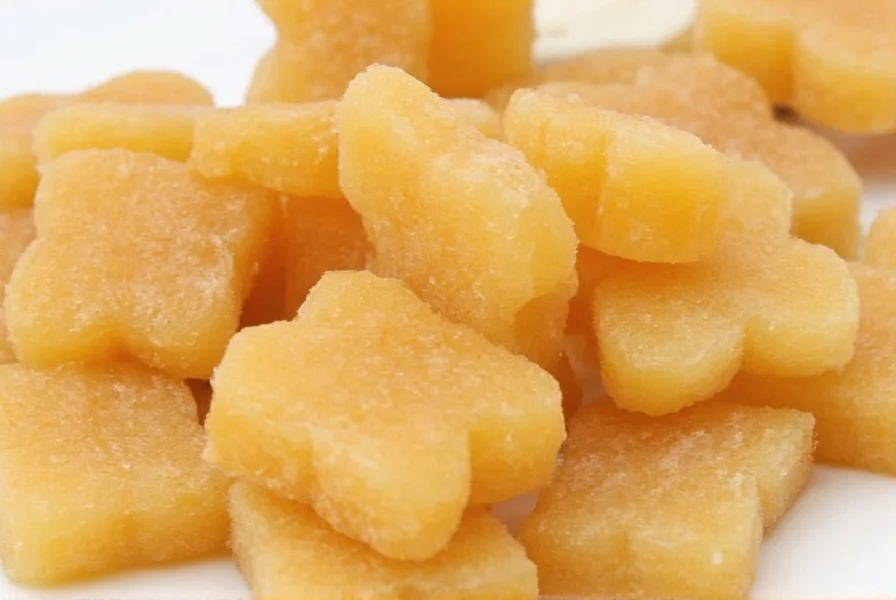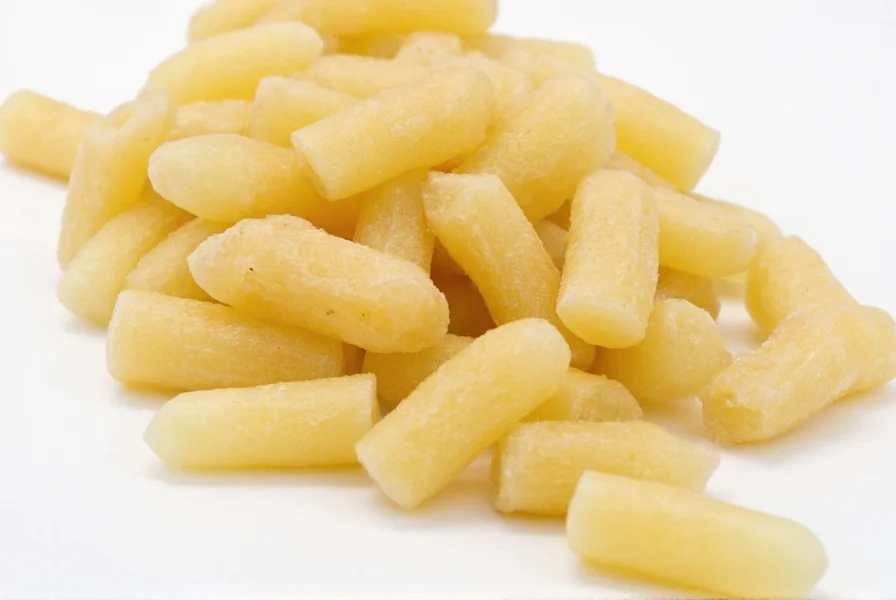When evaluating whether ginger chews deliver genuine health benefits, it's essential to separate the properties of ginger itself from the commercial products marketed as ginger chews. Ginger root contains bioactive compounds like gingerols and shogaols that have been studied for their potential health effects. However, most commercially available ginger chews contain significant amounts of added sugar, which counteracts some of the potential benefits.
What Exactly Are Ginger Chews?
Ginger chews are candy-like products made from crystallized or candied ginger, typically combined with sweeteners like sugar, honey, or syrup. Unlike pure ginger supplements, these chews function as both a confection and a functional food. The ginger content varies widely between brands, with some containing as little as 5% actual ginger root extract.
| Component | Typical Amount per Serving (2 pieces) | Health Implications |
|---|---|---|
| Ginger root extract | 50-150mg | Provides active compounds for potential digestive benefits |
| Total sugar | 8-12g | Negates some health benefits; problematic for diabetics |
| Calories | 60-100 | Significant for frequent consumption |
| Added sweeteners | Varies by brand | May include honey, cane sugar, or corn syrup |
Scientific Evidence Behind Ginger's Health Properties
Research supports several health benefits associated with ginger consumption, though most studies use standardized ginger extracts rather than commercial chews:
- Nausea relief: A 2020 review in Nutrients found ginger effective for pregnancy-related nausea, chemotherapy-induced nausea, and motion sickness. The active compounds appear to work on serotonin receptors in the digestive tract.
- Digestive support: Studies show ginger may accelerate gastric emptying, which explains why many people report relief from bloating and indigestion after consuming ginger products.
- Anti-inflammatory effects: Gingerols demonstrate anti-inflammatory properties in laboratory studies, though the concentrations in commercial chews may be too low for significant systemic effects.
When considering are ginger chews good for you for digestion, the evidence suggests they may provide some immediate relief for occasional digestive discomfort, but they're not a solution for chronic digestive issues.

Sugar Content: The Critical Consideration
The primary health concern with most ginger chews is their sugar content. A typical serving (2 pieces) contains 8-12 grams of sugar—comparable to a small cookie. For individuals monitoring blood sugar or managing diabetes, this makes ginger chews sugar content concerns significant.
Dietitians generally recommend limiting added sugars to no more than 25g daily for women and 36g for men. Consuming multiple servings of ginger chews could quickly use a substantial portion of this allowance without providing significant nutritional value beyond the ginger compounds.
Ginger Chews vs. Other Ginger Forms
Understanding ginger chews vs fresh ginger health benefits helps put these products in perspective:
- Fresh ginger: Contains all natural compounds without added sugar; can be used in cooking, teas, or smoothies
- Ginger tea: Provides ginger benefits with minimal calories when brewed from fresh or dried root
- Ginger supplements: Standardized doses without sugar, though quality varies significantly between brands
- Ginger chews: Convenient but high in sugar; best viewed as occasional relief rather than daily health food
For those specifically wondering are ginger chews good for morning sickness, they may provide convenient nausea relief during pregnancy, but pregnant women should consult their healthcare provider about appropriate consumption levels due to the sugar content.
When Ginger Chews Might Be Beneficial
Certain situations where ginger chews could provide practical benefits include:
- Travel nausea: Their portability makes them convenient for motion sickness relief during travel
- Post-operative nausea: Some hospitals offer ginger products as complementary nausea management
- Occasional digestive upset: As a convenient option for immediate relief from mild indigestion
However, for regular digestive health support, incorporating fresh ginger into your diet represents a healthier long-term approach than daily ginger chew consumption.
Choosing Higher-Quality Ginger Chews
If you decide to use ginger chews, consider these factors when evaluating how to choose quality ginger chews:
- Check the ginger content—higher quality products list specific amounts of ginger extract
- Look for options with natural sweeteners like honey instead of corn syrup
- Consider sugar-free versions that use erythritol or other sugar alcohols (though these may cause digestive issues in some people)
- Avoid products with artificial flavors and colors
For those concerned about daily intake, understanding how many ginger chews should you eat a day is important. Most manufacturers recommend 2-4 pieces daily, but from a health perspective, limiting to 1-2 pieces occasionally is more appropriate given the sugar content.

The Bottom Line on Ginger Chews
Ginger chews offer a convenient way to access some of ginger's digestive benefits, particularly for nausea relief. However, their high sugar content means they shouldn't be considered a health food or consumed regularly as part of a healthy diet. They're best viewed as an occasional remedy rather than a daily supplement.
For most people seeking the benefits of ginger chews for nausea without the sugar drawbacks, ginger tea or small amounts of fresh ginger may provide similar benefits with fewer health concerns. If you have specific health conditions or are pregnant, consult with a healthcare provider before relying on ginger products for therapeutic purposes.
Do ginger chews actually help with nausea?
Yes, ginger chews can help with nausea due to the gingerols in ginger that affect serotonin receptors in the digestive tract. Multiple studies support ginger's effectiveness for motion sickness, pregnancy-related nausea, and post-operative nausea. However, the sugar content in most commercial chews means they should be used for occasional relief rather than daily consumption.
How much ginger is actually in ginger chews?
Most commercial ginger chews contain between 50-150mg of ginger extract per serving (typically 2 pieces), which represents about 5-15% of the product by weight. The exact amount varies significantly between brands, so checking the ingredient list for specific ginger content is recommended if you're seeking therapeutic benefits.
Are ginger chews safe for people with diabetes?
Most traditional ginger chews contain significant sugar (8-12g per serving) and aren't ideal for people with diabetes. Sugar-free versions using sugar alcohols exist but may cause digestive issues in some individuals. People with diabetes should consult their healthcare provider before using ginger chews regularly and monitor blood sugar levels if they do consume them.
Can ginger chews replace fresh ginger for health benefits?
Ginger chews provide some of the same active compounds as fresh ginger but with significant added sugar. For regular health benefits, fresh ginger in cooking, teas, or smoothies offers the therapeutic compounds without the sugar drawbacks. Ginger chews are best viewed as a convenient option for occasional nausea relief rather than a replacement for incorporating fresh ginger into your diet.
How many ginger chews can I safely eat per day?
Most manufacturers recommend 2-4 pieces daily, but from a health perspective, limiting to 1-2 pieces occasionally is advisable due to the sugar content. Consuming more than 4 grams of ginger daily (regardless of form) may cause heartburn or mouth irritation in some people. Those with gallstones or taking blood thinners should consult a healthcare provider before regular ginger consumption.
Frequently Asked Questions
Do ginger chews actually help with nausea?
Yes, ginger chews can help with nausea due to the gingerols in ginger that affect serotonin receptors in the digestive tract. Multiple studies support ginger's effectiveness for motion sickness, pregnancy-related nausea, and post-operative nausea. However, the sugar content in most commercial chews means they should be used for occasional relief rather than daily consumption.
How much ginger is actually in ginger chews?
Most commercial ginger chews contain between 50-150mg of ginger extract per serving (typically 2 pieces), which represents about 5-15% of the product by weight. The exact amount varies significantly between brands, so checking the ingredient list for specific ginger content is recommended if you're seeking therapeutic benefits.
Are ginger chews safe for people with diabetes?
Most traditional ginger chews contain significant sugar (8-12g per serving) and aren't ideal for people with diabetes. Sugar-free versions using sugar alcohols exist but may cause digestive issues in some individuals. People with diabetes should consult their healthcare provider before using ginger chews regularly and monitor blood sugar levels if they do consume them.
Can ginger chews replace fresh ginger for health benefits?
Ginger chews provide some of the same active compounds as fresh ginger but with significant added sugar. For regular health benefits, fresh ginger in cooking, teas, or smoothies offers the therapeutic compounds without the sugar drawbacks. Ginger chews are best viewed as a convenient option for occasional nausea relief rather than a replacement for incorporating fresh ginger into your diet.
How many ginger chews can I safely eat per day?
Most manufacturers recommend 2-4 pieces daily, but from a health perspective, limiting to 1-2 pieces occasionally is advisable due to the sugar content. Consuming more than 4 grams of ginger daily (regardless of form) may cause heartburn or mouth irritation in some people. Those with gallstones or taking blood thinners should consult a healthcare provider before regular ginger consumption.











 浙公网安备
33010002000092号
浙公网安备
33010002000092号 浙B2-20120091-4
浙B2-20120091-4